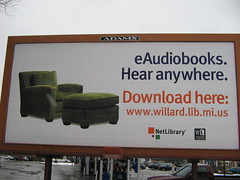Wired: Public Library Geeks Take Web 2.0 to the Stacks
Take a look at this excellent article in Wired about Helene Blowers and her Learning 2.0 program over at PLCMC. Michael Stephens and I had the privilege of speaking at the kickoff event last summer and I've been following her program ever since. Helene's program has been picked up in so many libraries worldwide that it has truly become an international hit. My congratulations to Helene and her team in Charlotte.
Learning 2.0, developed by public services technology director Helene Blowers, has become a surprise grassroots hit, available for free on the web and adopted by dozens of other libraries around the globe.
"We don't have to wait for some training company to come along and say, 'For $20,000 we'll show you how this stuff works,'" said Michael Stephens, who wrote Web 2.0 and Libraries: Best Practices for Social Software. "Helene put it on the web so anyone can use that program."
Article link.







